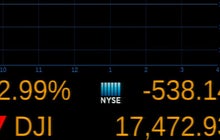begin quote from:
Global markets were under historic pressure Friday after voters in the United …
Why Brexit is so scary
Global markets were under historic pressure Friday after voters in the United Kingdom surprised the world with a decision to leave the European Union.And by all accounts, the pressure is set to continue as the eight-year-old bull market faces its most existential threat yet. This despite aggressive efforts by central bankers and other economic policy officials to bolster investor sentiment overnight with promises of dollar-swap liquidity and vague reassurances to lean against chaotic currency market volatility.
To say this result was unexpected -- a rejection of the post-war era of globalism driven by anger over immigration, stagnant economies and unaccountable bureaucrats in Brussels -- is a massive understatement. Betting markets had the odds of a "remain" vote at around 90 percent on Thursday. The Dow Jones industrials average enjoyed a surge back above the 18,000 level into the close, before the Brexit vote had ended.
By early Friday morning, the smell of panic was in the air.
The British pound dropped to levels not seen since the mid-1980s. A slipslide in U.S. equity futures was briefly halted as circuit breakers kicked in. European bank stocks, the epicenter of all of this because of their European bond holdings and exposure to the newly defined local economy, were crushed. A surge in the Japanese yen smashed popular currency carry trades and torpedoed the Nikkei 225 index to a loss of 1,286 points or a stomach-churning 7.9 percent in mere hours.
Greek stocks lost nearly 16 percent, while Italian stocks were down 12.5 percent. Italy is seen as a prime candidate to consider an independence referendum (along with France and the Netherlands) as pro-nationalist political sentiments rise. A breakdown in the European Union would threaten Greece's bailout programs, since a smaller Euro area would put the rescue burden on fewer countries.
The policy elites are in a serious bind with a situation that looks, in some ways, worse than the 2008-2009 financial crisis.
For one, all the obvious policy easing levers have already been pulled.
The Federal Reserve has only raised interest rates once this cycle, leaving the federal funds rate in a range between 0.25 percent and 0.50 percent. So there isn't much room to cut rates from here. Aggressive asset purchase stimulus programs have already been deployed, with the Fed holding nearly $4.5 trillion in assets vs. $900 billion back in 2008.
The Bank of Japan is buying stocks via exchange-traded funds. The ECB is buying corporate bonds. Both have deployed negative interest rates with calamitous effect as that has pressured bank profitability by narrowing net interest margins. What is left? The outright purchase of individual stocks? In the case of the Fed, this would be an illegal act.
Two, this comes at a time of global economic vulnerability.
Here in the United States, we're in the midst of an outright profits recession with S&P 500 earnings down for the last four quarters in a row, driven, in part, by strength in the U.S. dollar. Deflation is a real threat, made worse by elevated public debt-to-GDP ratios in the developed world. Spain, Poland, Greece, Italy, Switzerland and the euro area as a whole are all in outright deflation. France, the Netherlands, Ireland, Germany, the U.K., and Finland all have inflation rates near 0 percent.
Italy, a too-big-to-fail EU country, is among the worst off, suffering from an 11.7 percent jobless rate and a 133 percent debt-to-GDP ratio. Spain has a 21 percent jobless rate and is carrying a 99 percent debt ratio. Even France has a 96 percent debt ratio, with a 10.2 percent jobless rate.
In Asia, China is contending with a slow-burn credit crisis by attempting to manage down its already undervalued currency in an effort to bolster exports. A collapse in the British pound and the euro threatens that, which could unleash outright currency manipulation and charges of a mercantilist foreign exchange war. Japan is a mess, with a 229 percent debt ratio, a 6 percent budget deficit, deflation, and an economy on the verge of contraction as officials obsess over keeping the yen weak in a similar effort to bolster exports.
And three, any policy response is likely to only deepen the problem.
If central bankers support markets here -- keeping stocks in the low-volatility sideways crawl of the last three months, capping a three-year consolidation near Dow 18,000 -- it will prove hollow all the pre-Brexit fear mongering and will encourage pro-independence votes in Italy and elsewhere.
But if they let markets fall, volatility will begat volatility as one of the few bright spots in the global economy darkens. Years of central bank intervention and easy gains have encouraged risk taking and leverage accumulation.
The collapse could be swift and severe. Much depends on the movements of the currency markets. A rise in the dollar and the yen, if sustained and powerful, would be a sign that the problem is deepening as policymakers struggle with the one thing they can't control: The will of the voter.


No comments:
Post a Comment